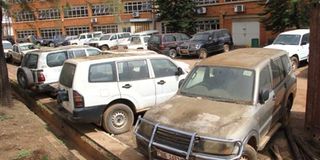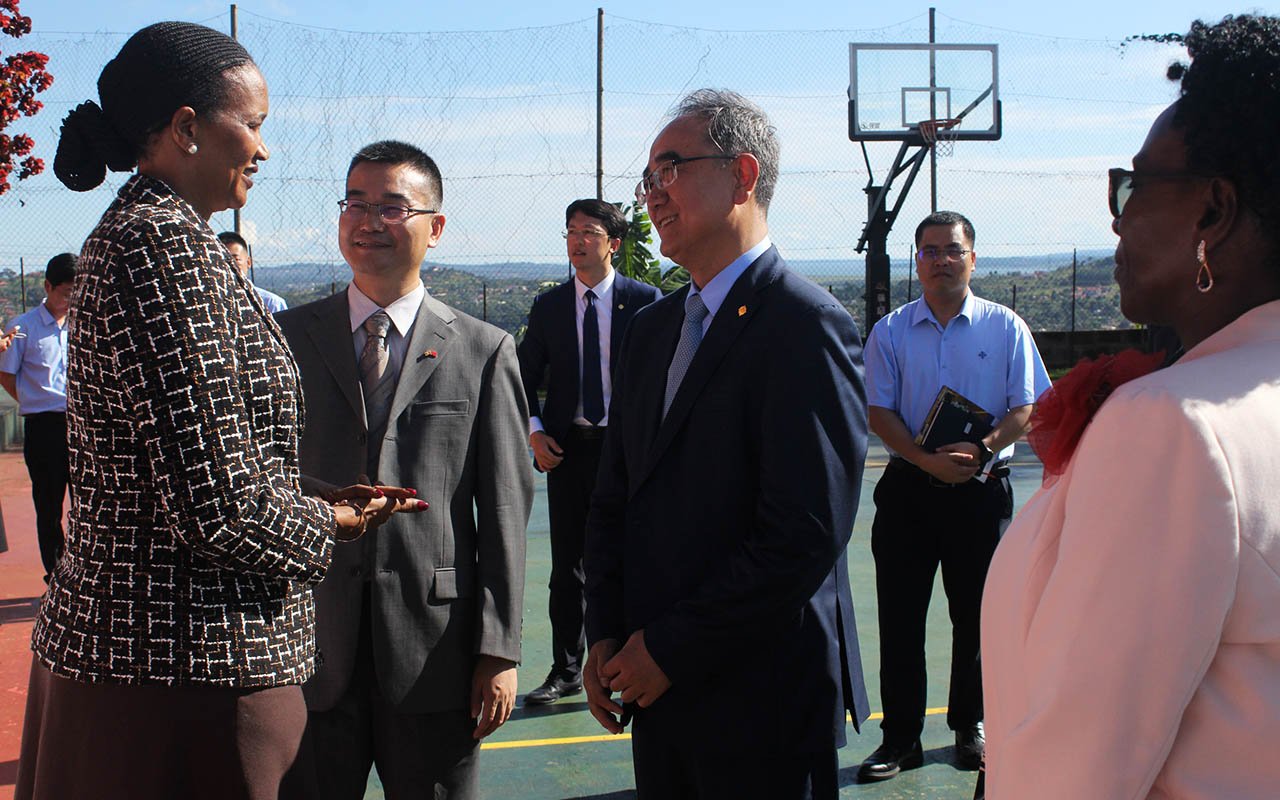Officials use high repair costs as trick to sell off govt cars

Government vehicles rot away in the parking yard at the Ministry of Public Service in Kampala. PHOTO/RACHEL MABALA
What you need to know:
Some of the grounded vehicles are reportedly still in good condition while vandals have stolen accessories and vital parts from others.
Some districts across the country are disposing of government vehicles cheaply on the pretext of being in poor mechanical condition, Daily Monitor has established.
A snap survey has revealed that suspected vandals rip out constituent parts and accessories such as engines, seats, gauges, radios and metres from the vehicles in question.
In Lwengo District, where nearly 19 vehicles have been grounded for two years, an auction sanctioned by authorities has seen nine vehicles and five motorcycles go under the hammer.
Mr Ibrahim Kitatta, the Lwengo District chairperson, confirmed that the district now has only five grounded vehicles including one for the chairperson, vice chairperson, chief finance officer and agriculture department.
“We now plan to allocate more resources to the works department to repair the grounded vehicles and also lobby for new ones,” he said.
However, a district staff member who preferred anonymity revealed that many vehicles are usually grounded deliberately even when they are operable.
“Such vehicles are usually disposed of at a time when a new executive is coming in,” the staff member said.
The staff member added: “Sometimes, they do it when new vehicles have been purchased and even those in very good condition or those which have served a small period, are bought by the same officials or those close to them.”
This is not any different in Mubende District as councillors essentially auctioned 23 grounded vehicles to themselves at just Shs30 million. These included tractors, double cabin pickup trucks and motorcycles.
“Surprisingly, even the vehicle (Nissan Patrol) which the former district chairperson, Gen Kasirye Ggwanga, used to drive in early 2000s, and the district council had resolved to preserve for future generations, was also disposed of,” Mr Vincent Tumusiime, the district chairperson for finance, said.
Mr Tusiime pegged this rather curious sale of vehicles on the previous council led by former district chairperson, Francis Kibuuka Amooti.
But Mr Amooti insists that when handing over office, the vehicles were still at the district park yard.
“Those properties were sold in early July not April as claimed. There have been attempts by councillors to sell those vehicles since 2016, but I blocked them.When they realised that I had left office, they did what they had all along wanted. I will petition the Inspector General of Government to intervene,” he said.
Mr Robert Mbabazi Kakwerere, the Rukiga District chairperson, said plans are under way to dispose of five grounded vehicles. The vehicles reportedly need repairs that require a lot of money. “After disposing of those vehicles, the money raised shall be allocated to departments to execute government field work. Money projected to be received after selling all of them cannot even buy a new one,” Mr Kakwerere said.
Same script, different cast
In many other districts, grounded vehicles are gathering dust at district headquarters. Some of the grounded vehicles include ambulances, double cabin pick-up trucks and tractors. Most of the grounded fleet was a government donation to districts to bolster their road units in 2012 and 2017.
Daily Monitor has learnt that some district workers have had to resort to using either private or public means to do official work. In the island district of Kalangala, for instance, more than 20 vehicles are grounded.
Mr Rajab Ssemakula, the district chairperson, said only two of the 10 departments have functional vehicles.
“It is only the education and health departments which have vehicles and this has affected service delivery,” Mr Ssemakula revealed, adding that he too lacks an official vehicle.
Mr Ssemakula sometimes uses a district staff van or personal motorcycle while executing official work.
“The conditional grants we receive from the central government have no budget to repair district vehicles and the local revenue which was partially used to cater [for] such repairs, is currently wired to the centre which determines what to send back.”
Mr Sulaiman Ssemwanga, a senior vehicle mechanic in Nyendo, a Masaka city suburb, said grounded vehicles unsurprisingly deteriorate in their economic value due to depreciation.
“Unless districts change the way they manage their fleet, they will continue losing their vehicles due to poor maintenance,” Mr Ssemwanga said.
Minister speaks out
Mr Raphael Magyezi, the Minister for Local Government, said government is investigating possible collusion and corruption in the sale of district vehicles.
“We are investigating those who purportedly auction government vehicles and sell to themselves and their circles,” he said.
Mr Magyezi said local governments are expected to do the heavy lifting in servicing and maintaining their fleet.
He reckons that the money from the centre appropriated for vehicle maintenance and another chunk from the Covid-19 relief kitty should stand districts in good stead.
Recently, each district and city received Shs150m and municipalities got Shs100m to facilitate community-level responses of regional and district local Covid-19 task forces.
Whereas Mr Magyezi advised districts to develop their own vehicle maintenance plans, the Sembabule District chairperson, Mr Patrick Nakalubo, said a disconnect is not helping matters. “This is why we have decentralization, CAOs and town clerks should always offer guidance on that,” Mr Nakalubo whose district now only has three functional cars, down from a fleet of 12.
Mr Nakalubo said Sembabule has faced challenges during the Covid-19 pandemic period where they require emergency vehicles to ferry patients to health centres and referral hospitals.
For the few months he has been on the job, Mr Nakalubo said he noticed that some civil servants use government vehicles for personal errands.
In Lyantonde District, there are only two vehicles in good mechanical condition.
Mr Paul Male, the Lyantonde assistant chief administrative officer, said: “The mechanical imprest we receive cannot repair even two vehicles. So, we painfully end up abandoning the vehicles because we lack funds.”
In Bukomansimbi — where 10 vehicles are grounded — an auction is in advanced stages.
The district chairperson, Mr Fred Nyenje Kayiira, said they will come up with a clear plan of routine servicing and maintenance of all the vehicles.
Yumbe is also in the latter stages of disposing of some of its grounded fleet.
Mr Brian Ojock, the Yumbe District assistant chief administrative officer in-charge of administration. Said they are awaiting a survey report conducted on the assets indicating which ones [are] to be disposed of or to be repaired.
Similarly, in March the Kabarole District council passed a resolution okaying the sale of some of the grounded vehicles.
Red tape rears ugly head
The disposal process is not quite moving apace in Arua where the grounded fleet includes ambulances that Arua City Woman MP, Ms Mourine Osoru, donated last March.
In Bushenyi, only the education, health and work departments have vehicles at their disposal much to the frustration of the chief administrative officer, Mr Willy Bataringaya, who said they need at least 11 vehicles.
“The district has no money and above all you may find that the cost of maintaining these vehicles is high,” Mr Bataringaya said.
The acting Apac District engineer, Mr Gaston Olal, said only one of the nine vehicles is grounded.
In Kabale, the district chief administrative officer, Mr Edmund Ntimba, revealed that six vehicles are shared across 13 departments.
He said they are considering repairing one double cabin pick-up truck that has been grounded for nearly four years.
The entire fleet in Serere District is grounded, leaving the new chairperson, Mr Stephen Ochola, speechless.
A three-hour drive away in Tororo, nearly 51 vehicles are grounded. Red tape has stopped them from being disposed of. The acting district information officer, Mr Jackson Osudo revealed that “most of the vehicles don’t need major repairs, but the district doesn’t have enough resources.”
The cry in neighbouring Mbale is similar with nearly Shs400 million needed to repair five grounded vehicles.
The report in northern Uganda also makes for grim reading with Amuru (10 out of 28) and Gulu (24) having most of their fleet grounded.
In Busia District, only a dozen vehicles are in good condition.
Mr Stephen Bwire, a resident of Busia Town, said in the past vehicles have been sold cheaply after the district failed to fund minor repairs such as wheel alignment.
Bureaucracy compounds any efforts to repair vehicles as Kamuli’s district works officer, Mr Fred Nabala, revealed.
He said: “You find that we have a road works tipper which needs repair, but we are told to go through the regional mechanical workshop, request for a carrier from Kampala and take it to Spear Motors for repair which process may mature in November rendering roadworks delay and we are accused of incompetence.”
Consumptive expenditure
At Independence in 1962, Uganda had only 18 districts. When the ruling National Resistance Movement came to power in 1986, that number had only marginally increased to 33.
Today, the number has swelled exponentially to 135 districts and more than 10 cities.
In 2019, President Museveni warned then local government minister, Mr Tom Butime, against the creation of too many municipalities and town councils.
Mr Museveni feared that a huge public expenditure bill would put a strain on government coffers.
At the onset of decentralisation in 1993, the government — envisioned under the Local Government Act — that power was to be devolved to local authorities. This was expected to foster political and administrative participation among the ordinary citizens, with the sum total being improvement in service delivery and a sensitivity to community needs.
Critics, however, say the surge in the number of districts over the years is nothing more than gerrymandering. Decentralisation has neither improved service delivery nor made the devolved units sensitive to community needs. The road networks largely remain poor, and challenges such as access to clean water and health services abound.
Compiled by A. Ssenkabirwa, W. Kutamba, R.Muhereza, P. Ssekandi, F. Warom , S.Ssemugenyi, A. Ashaba, P. Wafula, F.Ssewajje, R. Elema M.Bandiho, S.Ojok, G.Muron, J. Omollo, P.Masongole, G. Okot, Tobbisa J Owiny, Sam Opio Caleb, D. Awori & A. Kirunda.




